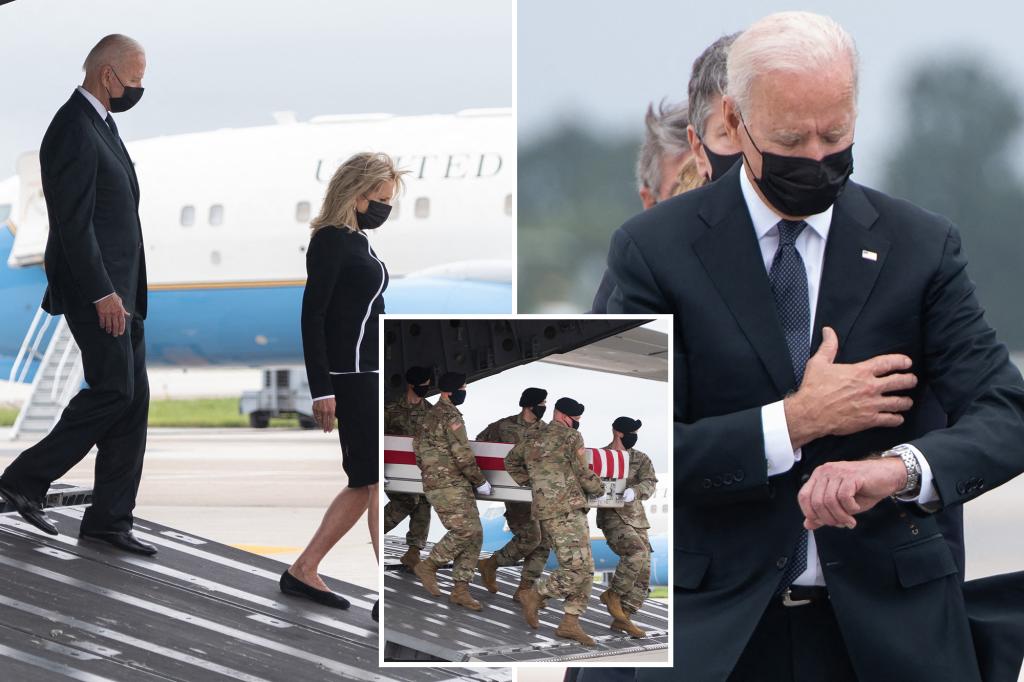The dignified transfer ceremony at Dover Air Force Base on August 26, 2021, intended to honor the thirteen American service members killed in the Kabul airport attack, became a focal point of controversy and grief for the families of the fallen. Multiple family members allege that President Biden delayed the ceremony by three hours, remaining aboard Air Force One while they waited. Roice McCollum, sister of fallen Marine Rylee McCollum, stated she was informed by a military officer that the president was napping on the plane. This account was corroborated by Darin Hoover, father of Staff Sgt. Taylor Hoover, and Christy Shamblin, mother-in-law of Sgt. Nicole Gee, both of whom lost their loved ones in the Kabul attack. They expressed their frustration and anguish at the perceived disrespect shown by the delay, with Hoover referring to the president as a “doddering old fool” in his interview with the Daily Mail.
The incident at Dover compounded the existing pain and anger felt by many of the families regarding the circumstances surrounding the Afghanistan withdrawal and the Kabul airport attack. The withdrawal, occurring after two decades of war, was widely criticized for its chaotic execution and tragic consequences. The bombing at Abbey Gate, which claimed the lives of thirteen American service members and over 170 Afghans, became a symbol of the human cost of the withdrawal. The families’ allegations of the president’s nap during the dignified transfer further fueled their sense of betrayal and abandonment, adding another layer of complexity to their grieving process.
The White House vehemently denies the allegations of the president napping during the ceremony. A spokesperson reiterated President Biden’s previous statements expressing his deep respect and gratitude for the fallen service members, emphasizing the “sacred debt” owed to them and their families. The spokesperson dismissed the claims as “untrue,” reiterating the administration’s official stance on the matter. However, the families’ accounts persist, creating a stark contrast between the official narrative and the lived experiences of those who lost their loved ones.
The controversy surrounding the dignified transfer ceremony highlights the deep divisions and raw emotions surrounding the Afghanistan withdrawal. For the families of the fallen, the alleged delay represents a profound disrespect to the ultimate sacrifice made by their loved ones. Their accounts paint a picture of a president seemingly detached from the immediate grief and suffering caused by the Kabul attack, further exacerbating their sense of loss and betrayal. The incident became a symbol of the perceived disconnect between the administration’s pronouncements of respect and the actual treatment of the grieving families.
The incident at Dover also draws attention to the broader criticisms leveled against the Biden administration’s handling of the Afghanistan withdrawal. The chaotic nature of the withdrawal, culminating in the deadly attack at Kabul airport, fueled widespread criticism and raised questions about the administration’s planning and execution. The families’ accounts of the delayed dignified transfer ceremony add to this narrative, reinforcing the perception of a lack of sensitivity and respect for the fallen service members and their families. The incident became a microcosm of the wider dissatisfaction and anger surrounding the withdrawal, further eroding public trust and confidence in the administration’s handling of the situation.
The conflicting narratives surrounding the dignified transfer ceremony underscore the importance of transparency and accountability in the aftermath of such tragedies. The families’ accounts, while disputed by the White House, raise serious questions about the administration’s handling of the event and its treatment of the grieving families. Their experiences highlight the need for a thorough and impartial investigation into the matter, to establish the facts and provide closure for those affected. Furthermore, the incident serves as a stark reminder of the profound impact of political decisions on the lives of ordinary people, and the importance of empathy and respect in responding to such tragedies. The controversy surrounding the dignified transfer ceremony underscores the need for a more compassionate and humane approach to dealing with the human cost of war and conflict.

